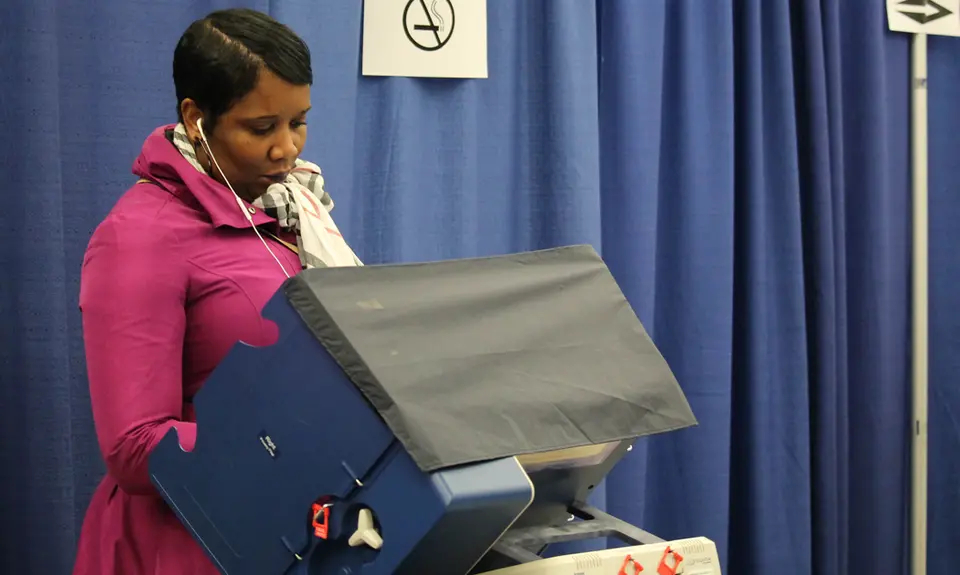“Confirmed Judges, Confirmed Fears” is a blog series documenting the harmful impact of President Trump’s judges on Americans’ rights and liberties. Cases in the series can be found by issue and by judge at this link.
Trump Seventh Circuit judge Amy St. Eve cast the deciding vote to block a district court order that extended important deadlines concerning absentee voting in Wisconsin. A Republican-appointed judge dissented, calling the ruling a “travesty.” The October 8 2020 decision is in Democratic National Comm. v. Bostelmann.
As in a number of other states, litigation concerning extensions of time and other measures to make it easier for voters to cast absentee ballots in light of the COVID-19 pandemic has been pending in Wisconsin. On September 21, after considering extensive evidence that was largely undisputed, a district court judge ordered several such extensions in Wisconsin. Most importantly, these included a one-week extension of the time for voters to receive an absentee ballot (including allowing it to be received online) for voters who timely requested such a ballot but did not receive one; a similar extension for online registration; and a six-day extension of the time for election officials to receive a cast absentee ballot, provided that the ballot is postmarked on or before Election Day.
Although the state did not object to the order and the state election commission was preparing to comply with it, the Wisconsin Republican legislature objected and sought a stay of the order in the Seventh Circuit court of appeals. In an unsigned opinion in which Trump judge St. Eve cast the deciding vote, the court granted the stay and effectively blocked the district court order. The majority maintained that the order was too “close to an election,” and that “political rather than judicial officials are entitled to decide when a pandemic justifies changes” to election rules. According to the majority, Wisconsin voters “have had a long time to cast ballots while preserving social distancing.”
In an extensive 25-page opinion, Judge Ilana Rovner, who was nominated by President George H.W. Bush, strongly dissented. She pointed out that in the April Wisconsin primary, it took court orders approved by the Seventh Circuit that are “comparable” to key provisions in the September order to rescue “from the trash bin” some 80,000 absentee ballots that were delayed “by an overwhelmed election apparatus and Postal Service” during the pandemic. The majority’s order, she went on, will mean that “many thousands of Wisconsin citizens will lose their right to vote despite doing everything they reasonably can to exercise it.”
Rovner carefully explained why the majority’s arguments did not justify “a stay of the district court’s careful, thorough, and well-grounded injunction.” She noted that the September order was issued significantly further away from the election than the changes approved by the court for the April primary, left “ample time” for election officials to make any needed adjustments, and was consistent with the principle that changes not be made too “close to an election.” The majority’s claim that legislative rather than judicial officials should make any changes necessary as a result of a pandemic, Rovner continued, created an improper “carve-out” from the principle accepted by the courts that “strict judicial scrutiny” is appropriate when legislative inaction results in “severe restrictions” on the right to vote, as in this case. Although voters theoretically could request and cast absentee ballots early, she went on, it is improper to “insist that voters act more quickly than state deadlines require them to do in order to ensure that either the State or the Postal Service does not inadvertently disenfranchise them because they are overwhelmed with the volume of mail-in registrations and absentee ballots” in the face of a worsening pandemic in Wisconsin.
Although it is possible that the full Seventh Circuit or the Supreme Court could reverse the panel decision, such a prospect does not appear likely as the election approaches. Trump judge St. Eve’s deciding vote will clearly have serious harmful effects on Wisconsin voters. As Judge Rovner concluded:
"It is a virtual certainty that current conditions will result in many voters, possibly tens of thousands, being disenfranchised absent changes to an election code designed for in-person voting on election day. We cannot turn a blind eye to the present circumstances and treat this as an ordinary election. Nor can we blindly defer to a state legislature that sits on its hands while a pandemic rages. The district court ordered five modest changes to Wisconsin’s election rules aimed at minimizing the number of voters who may be denied the right to vote. Today, in the midst of a pandemic and significantly slowed mail delivery, this court leaves voters to their own devices. Good luck and G-d bless, Wisconsin. You are going to need it."
